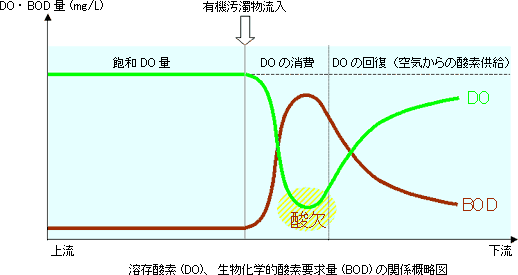|
|
Wetland and Surface Water
|
BOD, Indicator for Organic Pollution
As an indicator fpr aquatic environment, various indicators are available. Biochemical Oxygen Demand (BOD) is one of those and it represent the level of organic pollution. Organic pollution originats to the domestic wastewater and improperly treated livestock excreta. So now, what is BOD specifically?
As we human beings breathe oxygen for lives, aquatic lives breathe oxygen, but not from air but water. This oxygen disolved in water is called Disolved Oxygen (DO). Higher level of DO means easier for aquatic lives to breathes, and vice versa. The maximum level of DO is limited due to the condition of atomospheric pressure and/or water temperature, but it can be assumed about 10mg/L.

What do you think would be going on if large amount of organic pollutant were dumped into the watershed which has high DO level? Large amout of organic matter and oxygen is in fact perfect combination for decomposer such as microbe to be active, and this is essential process to decompose pollution to be back clearn aquatic environment. However, DO would be depliciated too much by decomposer if there are too much of organic pollution, and result in oxygen dificiency for aquatic lives. This amount of DO which would be depliciated by decomposers are called BOD, and uses as indicator of organic pollusion since it has positice correlation with the amount of pollusion. |
|
 |
|
Appropriate aquatic environmental conditions are set by Ministry of Environment with respect to each aquatic classification. Upstream of Kushiro river, for example, are set as AA, so the appropriate aquatic environmental condition in terms of DO level would be 7.5 mg/L and up according to the following table.
|
|
|
Class
|
Purpose of Use
|
Environmental Standard
|
|
PH
|
Chemical Oxygen Demand
|
Suspended Solid
|
Disolved Oxygen
|
Coliform Bacteria
|
|
(PH)
|
(COD)
mg/l
|
(SS)
mg /l
|
(DO)
mg /l
|
MPN
/100ml
|
|
|
AA
|
First Class Domestic Use |
6.5 to 8.5
|
1 or less
|
1 or less
|
7.5 and up
|
50 or less
|
|
First Class Fishry |
|
Natural Environmental Conservation Purpose |
|
All item written below
|
|
A
|
Second, Third Class Domestic Use |
6.5 to 8.5
|
3 or less
|
5 or less
|
7.5 and up
|
1,000 or less |
|
Second Class Fishry
|
|
Recreational Use
|
|
All item written below
|
|
B
|
Third Class Fishery Use
|
6.5 to 8.5
|
5 or less
|
15 or less
|
5 and up
|
-
|
|
First Class Industrial Use
|
|
Agricultural Use
|
|
All item written below
|
|
C
|
Second Class Industrial Use
|
6.0 to 8.5
|
8 or less
|
No Suspended Trash
|
2 and up
|
-
|
|
Envr. Protective Purpose
|
|
|